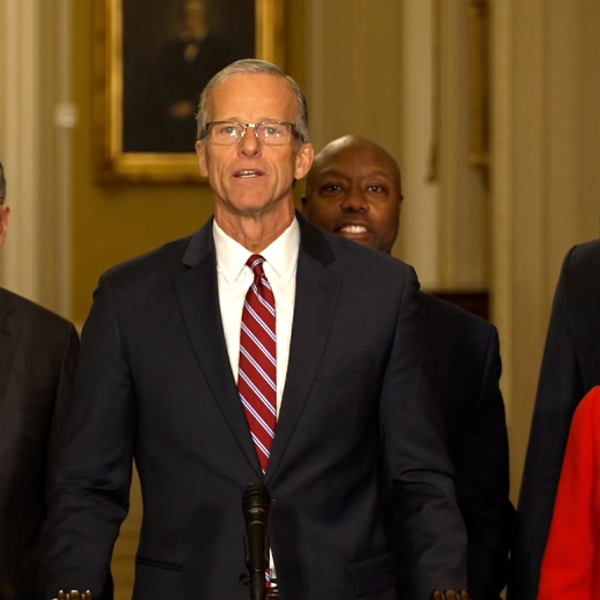Risking Everything, Republicans Bet On Angry Trumpist 'Lifestyle Brand'
Reprinted with permission from DailyKos
The Republican Party, this year more than any other since I've been covering politics, has become a fascination for me. While some readers here say it's all business as usual, it seems anything but to me. Sure, the underlying motivators of racism, misogyny, xenophobia, anti-LGBTQ hate, and amassing wealth and power have been and continue to be driving forces for the party and are simply more transparent than ever.
But on the other hand, Republicans' roadmap to obtaining power is perhaps more murky than at any point in my lifetime. When Mitch McConnell comes out and starts threatening American corporations, a sea change is at hand.
In fact, what seems to have happened since Donald Trump receded from the national stage is that congressional Republicans and some state officials have had to effectively become him in order to keep his base voters engaged—or should we say, enraged. So now, just like Trump threatened companies that angered him, McConnell is doing the same. And just like Trump swindled his base voters into donating gobs of money to him, House Republicans are now running the same scam. Perhaps even more telling, House Republicans are essentially presenting those donor solicitations as if they are coming from Trump himself. (Of course, Trump also relaunched his own fundraising operation this week complete with "Don't Blame Me — I Voted for Trump" swag. Not a joke. So now Trump's base will be getting fleeced from multiple directions.)
But it's a stunning turn of events—the party that once kowtowed to corporate America is now publicly jeering at them. That schism will only deepen as Republicans grow increasingly and more glaringly out of step with the culture of young, diverse, upwardly mobile consumers American businesses hope to cultivate. Meanwhile, GOP lawmakers are only getting more brazen and dug into their anti-culture politics. As I noted yesterday, Georgia's Republican House Speaker, David Ralston, defended the punitive measures they were targeting at their corporate detractors like this, "You don't feed a dog that bites your hand."
Ralph Reed, evangelical fire-breather and perennial GOP strategist, said the performative bellicosity had become the single most animating feature for Republican voters, describing it as a "virtue."
"It has become the overarching virtue Republicans look for in their leaders," Reed told the New York Times.
But the description of the GOP and its base that really brought it home for me this week came from Jonathan V. Last at The Bulwark. "Republican voters—a group distinct from Conservatism Inc.—no longer have any concrete outcomes that they want from government," he wrote. "What they have, instead, is a lifestyle brand."
That to me, is the best summation possible of the hollowed out, defunct, and unmoored Republican Party—it's no longer a political party, it's a lifestyle brand.
The questions I'm left with are: just how enticing will that newfangled lifestyle brand be to Trumpers; and can it appeal to the voters who still harbor a fondness for the political party they formerly belonged to? Because for all sorts of reasons, it's hard to imagine that Trump voters alone—even if they turn out readily in 2022, and it's a big if—will be enough to bring home big wins for Republibrand in the midterms.
There's already been signs of dissatisfaction within the GOP ranks since last November, though it's impossible to know exactly what to make of them. Identification with the Republican Party appears to have taken at least somewhat of a hit since last November and the Capitol attack, in particular, though it's not clear how significant or meaningful that hit is.
Bottom line—somebody's unhappy but it's hard to tell exactly who, how unhappy they are, and what that will mean for GOP turnout in the midterms. That said, there's nothing ideal about having a base that's a moving target and having almost zero data other than November 2020 to guide your turnout calculations.
Perhaps the biggest problem for Republibrand lawmakers is that they are courting two groups of voters that seem to be stylistically at odds with each other: angry Trumpers and suburbanites. I continue to be skeptical of the notion that the brass-knuckle tactics that have become a "virtue" for much of the GOP base hold nearly as much appeal in the more mild-mannered American suburbs, where people seem generally more inclined to want to work their jobs, spend time with family, and carve out a "comfortable" existence. Those folks typically want a growth economy that grows with their family, not a war on Major League Baseball at all costs or attacks on American businesses that interferes with their bottom lines. What suburbanites want is a measure of predictability so they can plan for the future with some measure of confidence that the world as they know it today won't be radically and fundamentally different from the world tomorrow. And nothing about the new Republibrand inspires confidence and stability.
Probably the best case study to date in how the new Republibrand will play in the suburbs during the midterms comes from the suburban vote in Georgia both last fall and in the January Senate runoffs.
In one instance, Trump is on that ticket and, in the next instance, Trump isn't. So we get to measure that difference. As an added bonus, both Republican candidates doubled down on Trumpism as they fought to win their runoffs. Sen. Kelly Loeffler went all in on racism, and Sen. David Perdue became the Trump mini-me of grift, notching a new stock-trading scandal almost weekly. Perdue also just decided to skip out on his debates with Democratic rival Jon Ossoff and he did so with impunity. In other words, both GOP candidates behaved about about as we can imagine many Republican candidates will in 2022.
Meanwhile, the Democrats ran like they were part of a political party, promising policy solutions aimed at meeting the needs of their constituents. One of their biggest promises, in fact, was passing a new coronavirus relief package that would include $2,000 direct payments.
In the runoffs, Ossoff ultimately defeated Perdue by just over a percentage point, 50.6 percent – 49.4 percent; while Democrat Raphael Warnock triumphed over Loeffler beat Loeffler by 2 points, 51 percent – 49 percent. But let's use Ossoff as an example since he was the squeaker.
In the general election, Joe Biden's win was powered by the shift among voters in the suburbs, college graduates, and high-income earners, according to turnout data from the New York Times. Here's how they shifted from 2016 to 2020:
- High-income earners: +7 points more Democratic
- Majority college graduates: +6 points more Democratic
- Suburban: +6 points more Democratic
Biden won the state 49.5 percent - 49.2 percent. Ossoff ran a touch behind Biden, losing to Perdue 47.9 percent– 49.7 perent. It was good enough to force the runoff, but also left Perdue with a reasonable opening to win reelection.
But the two Democratic Senate candidates prevailed in January based mostly on two factors: increased Black turnout in both suburban and rural counties, and depressed Trump turnout. Suburban voters of all races, particularly those surrounding Atlanta, helped contribute to those wins, though the biggest demographic shift in turnout was among Black voters specifically.
But for our purposes, the Republican Senators didn't fare much better among suburban voters in January without Trump on the ticket and, in fact, mostly fared worse. In suburban Cobb County, for instance, Ossoff ran +10.54 ahead of Perdue (53.96-43.42) in the general election but did even better in the January runoffs, running +12.08 (56.04-43.96) ahead of Perdue. The same was true for the largely suburban counties of Gwinnett, DeKalb, and Henry—Ossoff won with a bigger margin than in November.
So if the Georgia Senate runoffs are any gauge, Republibrand didn't pan out so well for the GOP in suburban America, even as voter turnout among Trumpers sank.
In truth, it's nearly impossible to know how all this will play out in the 2022 midterms. But the GOP brand is evolving and its base will necessarily evolve too. There's just no way Republicans can continue down this path of radical transformation without it having electoral consequences for their base. It's a fascinating turn of events given that just several months ago GOP lawmakers in Washington had a chance to abandon Trump. Now they are doing their level best to embody him and recreate the electoral magic that cost them the House, the Senate, and the White House. It seems nothing short of desperate, but they have also concluded it's their last best option.









